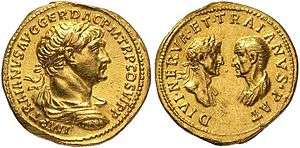Marcus Ulpius Traianus (senior)

Marcus Ulpius Traianus Maior (c. 30 AD – before 100 AD; Latin: Maior, "the elder") was a Roman senator who lived in the 1st century. He was father to the Roman Emperor Trajan.
Family
Traianus belonged to the gens Ulpia, originating from the Umbrian City of Tuder, and was born and raised in the city of Italica (modern Santiponce, near Seville, Spain) in the Roman Province of Hispania Baetica.[1] The Ulpii lived there from 206 BC, when the town was founded by Publius Cornelius Scipio, resettling wounded and invalid veterans of the wars against Carthage.[1] The Ulpii, like the Aelii and the Traii belonged to the leading Hispano-Roman families of the city.[1] From the latter family came a branch of the ancestors of Traianus, which intermarried with the Ulpii, originating the cognomen Traianus.[1] Since the father of Traianus joined the ranks of the Patricians in Rome, it is very likely that his grandfather had already belonged to the Roman Senate.[1] His mother's origin is unknown. His sister Ulpia would be the mother of praetor Publius Aelius Hadrianus Afer (father of the Emperor Hadrian). Traianus married a Roman noblewoman called Marcia.[2] She was the elder sister of Marcia Furnilla, the second wife of future Emperor Titus, and consequently was in a position to help the career of her husband.[2] They had two children, a daughter called Ulpia Marciana and a son, the future Roman Emperor Trajan.[2] He was the maternal grandfather to Salonina Matidia; a maternal uncle to praetor Publius Aelius Hadrianus Afer and a paternal great-uncle to Hadrian.
Career
Traianus was possibly a senator by the reign of Claudius.[2] Before 67 AD, Traianus might have commanded a legion under the Roman General Gnaeus Domitius Corbulo. Under Vespasian (who was the Roman Governor of Judea), Traianus commanded the tenth legion Legio X Fretensis during the First Jewish–Roman War between 67-68 AD. During this time he came into favour with the future emperor.
As a result of his military successes, Vespasian awarded Traianus the governorship of an unknown Roman province and a suffect consulship in September and October of 70 AD with Quintus Iulius Cordinus Gaius Rutilius Gallicus as his colleague.[3] His consulship had hardly ended when he was appointed governor of Cappadocia-Galatia (70/71 AD). He then served as governor of Syria in 73/74 AD, followed by a term as proconsul of Roman Asia in 79/80 AD. At an unspecified time he served as Governor of Hispania Baetica.[4] During his time in Syria, Traianus prevented a Parthian invasion.
Legacy
Traianus lived out his final years in honor and distinction. Indirect evidence suggests that he may have died before his son became emperor in 98 AD.[5] Around 100 AD his son Trajan founded a colony in North Africa. This colony became a town and was called Colonia Marciana Ulpia Traiana Thamugadi (modern Timgad, Algeria). His son named this town in honour of him, his late wife and his daughter. The colony’s name is also a tribute to his sister and his paternal ancestors. In 113 AD, Traianus was deified by his son, and his titulature reads divus Traianus pater.
Nerva–Antonine family tree
| Nerva–Antonine family tree | |
|---|---|
|
| |
| |
| Notes:
Except where otherwise noted, the notes below indicate that an individual's parentage is as shown in the above family tree.
| |
References:
|
See also
Notes
- 1 2 3 4 5 Strobel, Karl (2010). Kaiser Traian (in German). Regensburg: Friedrich Pustet. p. 40. ISBN 9783791721729.
- 1 2 3 4 Strobel, Karl (2010). Kaiser Traian (in German). Regensburg: Friedrich Pustet. p. 41. ISBN 9783791721729.
- ↑ Paul Gallivan, "The Fasti for A. D. 70-96", Classical Quarterly, 31 (1981), pp. 186-220
- ↑ Werner Eck, "Jahres- und Provinzialfasten der senatorischen Statthalter von 69/70 bis 138/139", Chiron, 12 (1982), pp.281-362
- ↑ Bennett (1997), p. 20
References
- http://www.roman-emperors.org/trajan.htm
- http://www.roman-emperors.org/wardoc2a.htm
- Bennett, Julian. Trajan: Optimus Princeps, Routledge, 1997. ISBN 0-415-16524-5